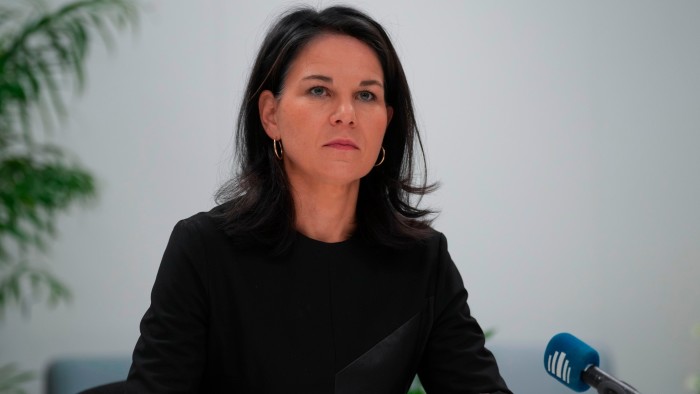Unlock the Editor’s Digest for free
Roula Khalaf, Editor of the FT, selects her favourite stories in this weekly newsletter.
Germany has accused COP29 host Azerbaijan of backing an attempt by fossil fuel producing countries to hijack the world’s most important climate summit as talks ran almost a day late.
Annalena Baerbock, Germany’s foreign affairs minister, warned that a “few fossil fuel states” were attempting a “geopolitical power play” in Baku, where almost 200 countries are debating a new climate finance goal and how to make progress on the shift away from oil, gas and coal.
Several people involved in the talks told the Financial Times that countries led by Saudi Arabia and Russia were attempting to block any references to advancing last year’s agreement to transition away from fossil fuels.
“It is clear who is pulling the strings of the COP29 presidency,” said one negotiator.
The UN climate summit has been overshadowed by Donald Trump’s US presidential victory. His election has stoked fears that global climate action would be rolled back in a year that is expected to be the hottest on record.
Speaking in Baku, Baerbock said oil and gas producing nations were playing a game on the “backs of the poorest and most vulnerable countries”.
“We as the European Union will not accept a deal that comes at the expense of those who suffer most from the climate crisis,” she said.
“We will not allow the most vulnerable to be ripped off by the few fossil fuel producing countries, who at this moment have the backing of the COP29 presidency.”
Azerbaijan relies on fossil fuels for export income to support its economy while Ilham Aliyev, its president, even praised the country’s “God-given” oil and gas in speeches during the opening days of COP29.
The COP29 presidency team, led by ecology and natural resources minister Mukhtar Babayev, declined to comment. Saudi Arabia did not respond to a request for comment and a person close to Russia’s delegation said they had no comment.
Last week, G20 countries failed to make explicit mention of dumping fossil fuels in the leaders’ declaration at a meeting in Rio de Janeiro. In New York in September, Saudi Arabia and other oil and gas producers were also accused of trying to block a reference to fossil fuels in the so-called UN Pact for the Future.
In Baku, wealthy western countries are under fire over a proposal for $250bn in climate finance that was branded inadequate and insulting by poorer countries.
Juan Carlos Monterrey Gomèz, Panama’s head of delegation, said the EU was playing “game[s]” by ensuring the negotiations dragged on.
“This is what they always do,” he said on Saturday. “They break us at the last minute . . . they push and push it and push it until the negotiators leave, until we’re tired, until we’re delusional from not eating, from not sleeping.”
That finance goal, which is aimed at helping developing countries shift to green energy and adapt to a warming world, was expected to be increased to $300bn in negotiations on Saturday evening.
But in the stadium where the summit is taking place, protesters chanted “No deal is better than a bad deal” and urged the G77 group of developing nations to walk away. The G77 has called for at least $500bn in finance.
Baerbock rejected the criticism of the low offer, arguing that no amount of money would be enough without emission reductions.
Climate Capital
Where climate change meets business, markets and politics. Explore the FT’s coverage here.
Are you curious about the FT’s environmental sustainability commitments? Find out more about our science-based targets here
https://www.ft.com/content/8c1031b6-2917-4e0f-904a-45f6cd20059e


